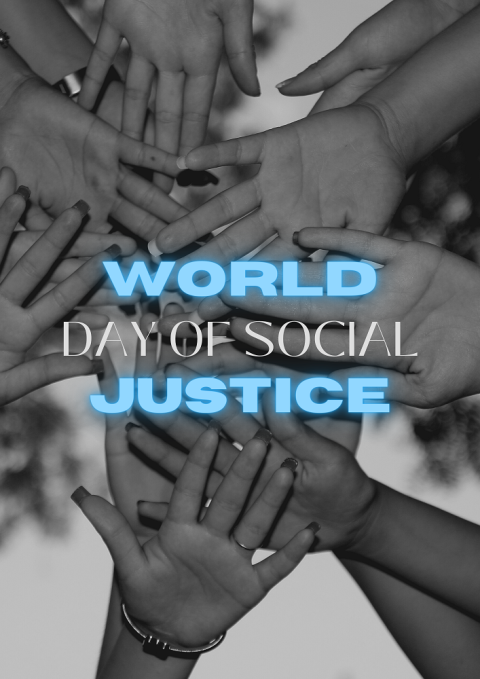Opportunities for social justice progression in law

Open Justice Centre Intern Teah Zdanowicz writes about opportunities for social justice progression in law for this blog written for World Day of Social Justice.
Law captures the essence of the moment, a moment so small only effecting a few or a moment so impactful that its effects ripple around the world and change the lives of many. The law is a powerful tool, it has the power to take and the power to give. On this World Day of Social Justice, it is important recognise the role that law has played in creating the conditions for a more socially just society and what progress is currently being made. From climate change to gender equality and ending racism to ending poverty, let the next decade be the time we realise the full potential the law has bring about social change.
Sometimes the take is justified, perpetrators of mass atrocities should have their liberty taken away. Their actions caused human suffering on a mass scale. However, in the last 100 years dictators and those who commit crimes against humanity are rarely brought to justice, from Hitler to Pol Pot, Hirohito and Pinochet each showing the darkest of humanity yet never held accountable. How can we ever expect to achieve a socially just society when, those who commit their crimes on the world stage for all to see do so without repercussions. When the authors of the holocaust were brought in front of the doc in the Nuremberg trials, the world witnessed the power of the law. Geoffery Roberts KC stated that Nuremberg created ‘a freestanding and universal jurisdiction to prosecute those who direct or assist a crime so heinous that it is ‘against humanity’ because the very fact that a fellow human being could conceive and commit it demeans every member of the human race, wherever they live and whatever their culture or creed.’(1) Only law has the power to correct these wrongs, however this can only be achieved through a proactive legal system that does not diminish the rule of law and takes every opportunity to punish crimes against humanity.
Philippe Sands KC, in collaboration with Stop Ecocide International, has been making the case for ecocide becoming the first new international crime since 1945. If successful it would criminalise acts of mass environmental destruction and ‘would build on the existing crime of severe damage to the environment during armed conflict, whilst reflecting the fact that today, most severe environmental damage occurs during times of peace, a situation that currently falls outside the jurisdiction of the ICC’ (2). Despite the Paris climate agreement being at the centre of how the climate crisis will be solved on an international scale, it lacks a much-needed enforcement mechanism which disallows governments to proceed into the future without keeping to their duties within the agreement. Introducing ecocide into the body of international crimes would only serve to enhance the socially just cause of protecting our home.
Since the Human Rights Act came into force in 1998, there have been many instances where it has protected the rights of the most vulnerable within the UK. The HRA protects civil and political rights such as the right to life, liberty, and freedom of speech. As we move into a world which is looking for further opportunities to deliver social justice, could it be time to provide a new human rights bill? In 2021 the Scottish Parliament announced plans to introduce human rights legislation that is unprecedented worldwide. The proposed new bill aims to introduce four United Nations human rights treaties into Scots law, including the International Covenant on Economic, Social and Cultural Rights, the Convention on the Elimination of All Forms of Discrimination against Women, the Convention on the Elimination of All Forms of Racial Discrimination and the Convention on the Rights of Persons with Disabilities. The bill is also said to include provisions to provide environmental rights, rights for older people and equality clauses for LGBTQI people. Much like the HRA, the new bill would allow people to rely on these rights in a court of law in cases against public bodies. The passing of this bill would give way to a deeper understanding of rights which are not covered in the HRA. For example, the right to healthy and safe working conditions, the right to housing, right to healthcare and many more. Enshrining these rights in law could prove to be ground-breaking in the fight for social justice.
There are many opportunities to advance social justice through law, as evidence here. However, before we can move forward with the new, we must close the gaps in our current legal system.
- Robertson, G KC. 2012 ‘Crimes Against Humanity, The Struggle for Global Justice’ Fourth Edition. Penguin, London
- Stop Ecocide International/ Stop Ecocide Foundation ‘Independent Expert Panel for the Legal Definition of Ecocide’ (2021) SE+Foundation+Commentary+and+core+text+revised+(1).pdf (squarespace.com) (Accessed 14/02/2023)
.jpg) Teah Zdanowicz
Teah Zdanowicz
Law School alumni Teah is currently interning with the Open Justice Centre, focusing on legal technology.
